Joel Kimball Diary - August 1874
![]()
"Mowed grass until noon and commenced to rain. Arthur and I got quite wet. Did not work in the afternoon.
"Went to post office, came home and done chores and went to M's, D's. Received of R Dougherty, $6.50.
"Commenced to make eel spear at blacksmith shop.
"Riley, one-half day
"Arthur, one-half day
"Paid Arthur Dodge $1.50."
Joel Kimball
Long after the irons rails have been pulled up and the Midland railroad's bed demolished, piece by piece, year after year, by the machineries of progress, the benefits gained by the line's existence, from an historical perspective, are as important now as they were when the trains chugged their way over the rails. With the final completion of the the line in 1873, the commercial value of the railroad was measured with the amount of freight hauled or the number of passengers carried over its route. The added benefit of bringing reliable and timely mail service into these isolated rural communities can be still felt today as area newspapers from this era filled their pages with reports from local community correspondents, their articles now able to ride the rails to meet the paper's publishing deadlines. The reports submitted by these correspondents were filled with newsworthy and trivial items alike, often laced with prejudicial opinions. Read singularly, these columns are just a list of unrelated news items; read over a period of time, they become a story of that community.
William Cairn's farm was located along the Beaverkill River, just over the Sullivan-Delaware county line, above Westfield Flats. Writing under the nom de plum of "Rusticus", he was perhaps the earliest correspondent serving the northern Sullivan County section when he began sending reports early in 1874 to the Middletown Mercury, Hancock Herald and Port Jervis Evening Gazette, all larger towns located along the Midland's route. The painting of a chicken coop or placement of a pig sty were as important to him as were the latest political coup or fellow correspondent's style, all items being of interest to his loyal readers, both then and now. - Fred
Sunday. August 2, 1874
"At home, stayed there until after noon then went to Purvis to church.
Called at Cyrus Mott's. Weather windy and showers."
Joel Kimball
The church at Purvis stands atop the knoll overlooking the valley of
the Little Beaverkill, the valley's fertile fields planted in hay and
grain belonging to the old Livingston farm. The building, erected in 1857,
is sturdily built, the framework consisting of post and beam construction,
which along with the bracing incorporated into the frame, allows for the
large congregational room inside. Aside from some of the beams being made
from hardwood, hemlock lumber, cut from the local mills, was used for the
remaining framework, siding, flooring and shingles. Four columns adorn the
the front entrance into the edifice, which along with other exterior
details, gives the building a colonial style in appearance. Inside the
sanctuary, a balcony is positioned behind the pulpit, the interior
plastered, papered and calcimined.

There are three other Methodist congregations within the Town of Rockland,
the largest at Westfield Flats, which has over fifty members. Though the
Morsston congregation is growing due to the numerous revival meetings
being held that are continuously adding to its numbers, the church shares
services with the other three locations, one minister serving all three
congregations. Today, the service at the Morsston church is conducted by
the Reverend Francis William Andrews. The forty-five-year-old Andrews has
served numerous church congregations throughout the county and beyond,
most recently serving at Downsville in Delaware County, until being
appointed as the circuit rider for the Rockland district in April of 1871.
- Fred
"Worked in hayfield all day, drew three loads. Good hay day.
"Arthur, one day
"Riley, one day"
Joel Kimball
After a winter of strife amongst its employees, followed by a spring of problems in maintaining its roadbed and tracks, the economic condition of the Midland railroad was beginning to show improvement during this first full summer of the line's full-service operation. The increased volume in freight and passengers hauled up and down the line has eased some of the railroad's financial burdens, being better able to compensate its workers. This week, employees of the railroad company received payment for the month of May. - Fred
"Weather still good, drawing four loads and finished clover corner.
"Arthur, one day
"Riley, one day"
Joel Kimball
"O. O. Horton is putting up a barn near his hotel"
Rusticus
August 4th, 1874
Evening Gazatte
When the Midland railroad line was built down the valleys of the lower Willowemoc and its tributary, the Little Beaverkill, its route followed the path of least resistance. For the community of Parksville, this path passed adjacent to the center of the hamlet, but further below, the line passed a considerable distance away for the settlements of Purvis and Westfield Flats. Depots were erected by the railroad to serve these distant communities but it was only a matter of time before business enterprises began to locate nearer the railroad and those landowners on whose property the railroad passed over, benefited greatly.
Horace Utter, the Westfield Flats tanner, owned the riverside property below the Cochran & Appley mills when the dream of a railroad passing through the area became a reality, and to his luck, it was to pass over his land. In January of 1871, Utter sold a strip of land, one hundred and ten feet wide, to the railroad company, and then divided his remaining property into building lots. William Keener and Orin Horton each bought lots along the bounds of the railroad early in 1874, the lots being directly across the railroad tracks from each other, and both immediately began erecting hotels on their premises. - Fred
"Commenced cutting across the road, cut quite a piece and drew in two loads. Weather very fine.
"Arthur, one day
"Riley, one day"
Joel Kimball
Orin O. Horton is from the Town of Colchester family that resided in the hamlet along the Beaverkill that still bears their name. The ancestral Hortons, the family of Orin's great-grandfather William, came to the valley of the Beaverkill in 1784. Being a tanner and currier, William is credited to have tanned the first hide of leather tanned in that Delaware County township.
The Horton family was well-known up and down the Beaverkill as lumbermen, with Orin's father, David, being one of the pioneering raftsmen from this section. Orin and his brothers continued the family business of dealing in lumber and rafting the Delaware, some of their river adventures being the source of numerous, and often humorous, tales told up and down the valley. The boy's rafting days were interrupted by the call to serve in the War of the Rebellion, Orin traveling over the hill to the recruiting office of the 56th New York Regiment at Callicoon Depot in the fall of 1861. His service was cut short when after the regiment's action with the Union Army during General McClellen's failed Peninsula Campaign the following spring, he was discharged with a depilating disease, an affliction that would haunt him throughout his remaining years.
Orin's venture into the hotel business began in early 1874 with the erection of the Horton House, situated next to the depot at Westfield Flats. To accommodate the new wave of the fishing public, the new barn was to serve the guests of the hotel, housing the means of transportation used to carry these anglers to their favorite fishing holes. - Fred
"Frank Beach commenced to work for me today. We finished mowing old meadow and drew in three loads and put up 27 cocks.
"Frank, one day
Arthur, one day
Riley, one day"
Joel Kimball
The attempt to replace the postmaster from the Westfield Flats post office was finally successful, according to news reported in today's newspapers, as Burr Wilson, the popular merchant at Westfield Flats and current postmaster, lost this politically influenced position. Though a member of the political party in power, Wilson angered local party leaders when he did not endorse the party's candidate for the position of town supervisor in last March's general election. Consequently, McKendry Dodge, the Republican candidate, was defeated by John Davidson. To add salt to Wilson's political wound, the new postmaster appointed for the Westfield Flats post office was McKendry Dodge; who by the way, was also Wilson's brother-in-law." - Fred
"Commenced new meadow, Robert Schriber helping me. Mowed until eleven o'clock and drew in two loads. Weather bad, did not work in the afternoon. Discharged Riley Brown.
"Riley Brown due for work, $14.50
Due for cash, $5.00
Balance due, $9.50
"Frank, one half day
Rob, one half day
Arthur, one half day
"Went up to depot."
Joel Kimball
During the summer, physicians from Sullivan County held meetings throughout the county in preparation for organizing the Eclectic Medical Society of Sullivan County, an auxiliary offshoot of the New York State parent organization, its stated purpose being to promote safe practices within the field of medicine. Holding its recent meeting at the Midland Hotel in Liberty, these area doctors adopted their chapter's constitution and elected officers, which included Asa Bennett, from the Town of Rockland, as the Society's first elected president.
The thirty-nine-year-old Dr. Bennett came from the large family of Samuel and Hannah Appley Bennett, who operated the farm and lumber-mill located along the Willowemoc near Buck Eddy, the family moving onto the farm from the Hancock area in 1845. The summer of 1874 was also noteworthy for the good doctor, for he commenced the building of his new residence and office along the road to Westfield Flats, between Cochran's mill and old Doc Wheeler's farm. - fred
Saturday, August 8, 1874
"Cloudy day, some rain, did not work in the hayfield. Commenced to braid
set line at John Decker's. Received mail, one letter from Newel."
Joel Kimball
A.S. Rockwell, the Westfield Flats merchant and lumber dealer, returned
from his journey to Philadelphia, where he went to negotiate prices on
lumber that he had earlier sent down the river to market. He was not as
successful as he had hoped for, a sign of the current hard economic times.
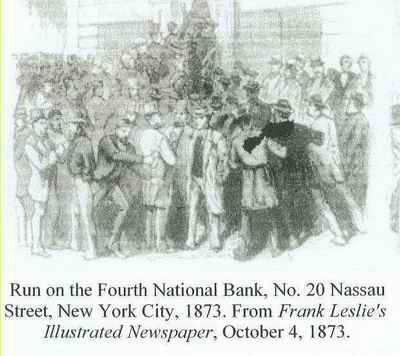 Experiencing
an economic expansion immediately after the Civil War, brought on by the
war-fueled industrial revolution and an overextending railroad industry,
the nation's economy received a severe jolt in the fall of 1873 when,
after a series of economic setbacks during the previous couple of years.
institutions within the banking industry, heavily invested into the
railroad industry with risky outstanding loans, were forced into
bankruptcy, causing the Panic of 1873. The ensuing run on on these
financial institutions closed many investment firms, the effects of which
rippled throughout all segments of the nation's economy, causing a deep
and long recession.
Experiencing
an economic expansion immediately after the Civil War, brought on by the
war-fueled industrial revolution and an overextending railroad industry,
the nation's economy received a severe jolt in the fall of 1873 when,
after a series of economic setbacks during the previous couple of years.
institutions within the banking industry, heavily invested into the
railroad industry with risky outstanding loans, were forced into
bankruptcy, causing the Panic of 1873. The ensuing run on on these
financial institutions closed many investment firms, the effects of which
rippled throughout all segments of the nation's economy, causing a deep
and long recession.
New construction at Philadelphia came to a relative standstill, the
sudden flood of the year's rafted lumber now piled high on the city's
wharfs. This overabundance of lumber caused the price of lumber to become
depressed, sending local dealers such as Rockwell back home with less than
they bargained for. Fred
"Stayed at home. Dave and Julia came over.
"Mother and Adele went to Purvis Church to quarterly meeting.
"Called At Col. Moore's with Dave in the afternoon."
Joel Kimball
There was not a preacher better known amongst parishioners of Sullivan County than the Rev. Francis Andrews. His Sunday sermons were of such power that his message persuaded many wayward folks to join the growing flock of the congregations, no matter what church he was assigned to. Before joining the ministry, the forty-five-year-old Andrews taught school at Thompsonville and Phillipsport for five years, until, in 1855, he joined the Methodist Council of New York. He afterwards served congregations at Grahamsville, Fallsburgh, Sandburgh, Pike Pond, Mongaup Valley and Colchester before being appointed to the Rockland circuit in 1871. fred
"Robert Schriver and Frank Beach came and helped me and we worked all day in the hay field. Very good day. Drew in five loads of hay.
"Robert Schriver, one day
Frank Beach, one day"
Joel Kimball
The boys who have gone to work for Joel during the past year haven't lasted long under his employment, for whatever the reasons. The latest, young Riley Brown, who negotiated the salary with his employer to be a dollar a day "if he could earn it", apparently wasn't able to fulfill this obligation and was discharged on Friday, Joel paying him the agreed upon wage, for fourteen and one half days' work.
To help him finish-up the year's hay-cutting season, Joel went to his neighbors for assistance. Across the valley from the Kimball place were the Beach and Scriber farms, the boys from these families being quite familiar with farm work. Frank Beach, the twenty-three-year-old son of Gabriel and Nancy Steel Beach, assisted his parents on their farm and had apparently been caught up with the Beach farm chores and had time to help Joel. Robert Scriber, though still a teenager at seventeen years of age, also apparently was used to the hard work. The results of hiring these hard-working boys was apparent, cutting and hauling in five loads of hay, over twice as much as was gathered at any time with the lads previously employed by Kimball. - fred
"Worked all day in the hayfield, mowed in the orchard, drew in three loads. Very good day.
"F Beach, one day
Robert Schriver, one day"
Joel Kimball
For the folks up and down the Midland railroad's line, there was both good news and bad news being circulated. First the good news; it was reported in the local newspapers that the company's paymaster was expected to settle back wages due its employees, beginning on the fifteenth of this month. For those workers who have been without pay for over the past two months, this rumor was certainly encouraging.
At the same time, though, it was also reported that the Receiver for the bankrupt railroad company informed the local assessors along the line that the company would not be able to pay its assessed taxes due the State. Officials for the company threatened to abandon the railroad if were compelled to comply with the State. For those workers who have been without pay for over two months, this rumor was certainly discouraging. - fred
Wednesday, August 12, 1874
"Still at work in hayfield. Weather good.
"F Beach, one day
R Schriver, one day"
Joel Kimball
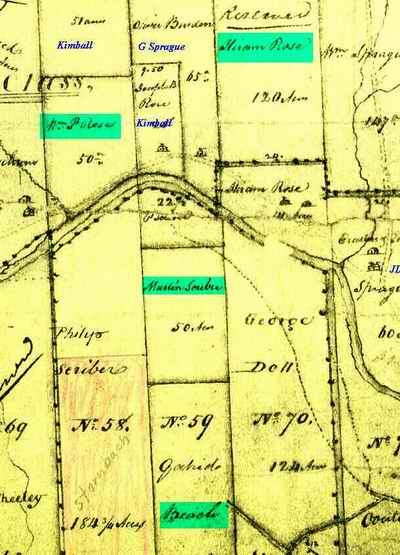 The
family farms of Frank Beach and Robert Schriber were directly across the
Willowemoc River from the Kimball place. Included is an early survey map
of the area, the title and source of which is unknown, showing ownership
of the parcels that were divided from the part of the original holdings of
the Livingston family. The exact date of this map is also unknown but it
appears to have been drafted, judging by the names of the landowners,
during the mid-eighteen-sixties. The Beach and Schriber places are
highlighted in green while the Kimball property in noted in blue.
The
family farms of Frank Beach and Robert Schriber were directly across the
Willowemoc River from the Kimball place. Included is an early survey map
of the area, the title and source of which is unknown, showing ownership
of the parcels that were divided from the part of the original holdings of
the Livingston family. The exact date of this map is also unknown but it
appears to have been drafted, judging by the names of the landowners,
during the mid-eighteen-sixties. The Beach and Schriber places are
highlighted in green while the Kimball property in noted in blue.
Both Martin Schriber and Gabriel Beach purchased
these lots from Samuel and Satilla Purvis, the Schriber lot in September
of 1860 and Beach in January of 1864, but both these and neighboring deeds
suggest that both families had been occupying these parcels before
ownership, probably renting from the original landowner, Robert
Livingston. The Purvis family had a long and close association with the
Livingston family, especially since 1824 with the arrival of Robert's son,
Edward, to the wilds of Rockland and who cared for the gentleman and his
wilderness estate. With the Purvis name on these deeds, it suggest that
Sam Purvis may have acted as land agent for the Livingstons at this time.
fred
Thursday, August 13, 1874
"Weather not so good, tried to cut all the hay, could not quite do it.
Drew in two loads and put up 36 cocks.
"Frank Beach, one day
R Schriver, one day
Five year old cow"
Joel Kimball
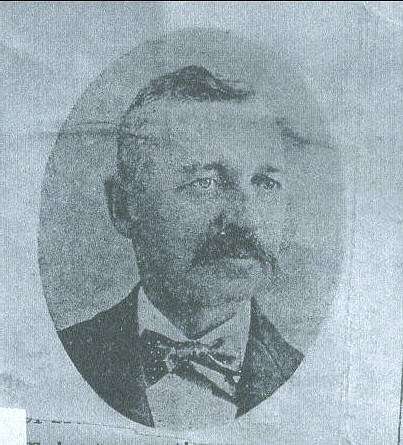 The
railroad depot at Morsston was now becoming a busy place. During the first
week of August, it was estimated that 170,000 pounds of freight was
shipped over the railroad. The general store next door to the depot, a
branch of the John H. Divine & Company of Ellenville, was also thriving
bringing more development to this vicinity. Throughout the spring and
summer, a new, handsome structure was being erected near the mercantile
business, and now, in August, with the plasterers finishing up their work,
the building would soon be ready for its occupant, Alvin Preston Dubois.
The
railroad depot at Morsston was now becoming a busy place. During the first
week of August, it was estimated that 170,000 pounds of freight was
shipped over the railroad. The general store next door to the depot, a
branch of the John H. Divine & Company of Ellenville, was also thriving
bringing more development to this vicinity. Throughout the spring and
summer, a new, handsome structure was being erected near the mercantile
business, and now, in August, with the plasterers finishing up their work,
the building would soon be ready for its occupant, Alvin Preston Dubois.
A. P. Dubois was one of the junior partners in the firm, coming from
Ellenville to this isolated, backwoods community in October of 1873, to
manage the company's new business concern. Previous to the move, in July
of that same year, he was married to Mary Eliza Hoar and soon the young
couple were about to move into their newly erected home. The couple only
intended to stay and manage the store as long as the local tanning
industry survived which, with the ever continuing depletion of tanbark,
they estimated to be ten years at the most. - fred
"Finished haying, drew in four loads. Weather some cloudy, called at Decker's.
"F Beach, 3/4 day
Rob Schriver, 3/4 day
"Frank Beach due for 6 1/4 days work @ 1.75, 9.75
Robert Schriver due for 5 1/4 days work @ 1.75, 8.00"
Joel Kimball
Even with the large number of unemployed workers resulting from the current recession, farmers still had difficulty finding help. As Joel found out during this harvest season, many who were out of work were not cut out for, nor particularly interested in farm labor, especially for meager pay. Locally, wages for farm labor averaged between $1.50 to $2.00 per day, and often included board. When Joel finally yielded to these prices, he found two willing young men who helped finish the haying season on the Kimball farm in rapid style. - fred
"Went to Flats and up to Hiram Hodge's, called at Dr. Bennett's and Oliver Borden.
"Rode to Morsston Depot on mail train and came home.
"Riley Brown due for cash, 5.00
Arthur Dodge due for cash, 5.00"
Joel Kimball
Hopping the Midland mail train from Westfield Flats to Morsston, Joel probably would have noticed the changes and supposed improvements made by the railroad company within the past few weeks. At the Westfield Flat depot he would have easily noticed the new station agent, Doc Wheeler's son, Frank. He would have been hard to miss for Frank, though well educated, was known for the attire he wore, often being shabbily dressed. As dirty as his clothing may have been, it was more than equaled by his crude language, and Frank delighted shocking the innocence of bystanders with his vulgar tongue.
Joel next would have noticed that the railroad company was sprucing things up. The interior of the newly erected depot at the Flats received its first coat of paint. As he rode over the route to Morsston, he would have seen that the bridges over the Willowemoc either had already received, or were in the process of being treated with a coat of whitewash, a concoction of lime and chalk. This poor-man's paint covered the timbers with a thick scaly crust, which railroad officials hoped would protect the wood from rot due from exposure to the elements or, more importantly, from fire ignited from hot embers blowing out the smokestacks of locomotives.
Arriving at Morsston, Joel would see that the railroad company increased the size of their store-house, adding an extension of twenty-four feet, along with the addition of a new store-house, fifty feet in length, for the tanning concern of S. Hammond & Sons. To handle the increasing flow of freight traffic at this depot, the company hired on an assistant for station agent Hoyt. - fred
"Went down to flats, called at Uncle Oliver's and at Joe Green's. Came home in the evening.
"Saw Emma Bush at Dr T's.
"Very warm weather."
Joel Kimball
From the headwaters of the Beaverkill and Willowemoc rivers to the confluence of their waters with the Delaware, one doctor served the residents of the area's small communities and surrounding countryside until 1866. The profession of a country doctor was often an arduous endeavor, having to travel rough backwoods roads in all sorts of weather, no matter what time of day, including the darkness of night, to visit their patients. Old Doc Wheeler was giving up his traveling practice and was now mainly dispensing medical advice, tonics and remedies from his home at Westfield Flats, when young Asa Bennett and Robert Tuttle began their practices in the Town of Rockland.
The thirty-seven-year-old Tuttle was born near the Delaware County seat of Delhi, later studying medicine at Albany Medical College. Upon graduation in 1862, while the nation was the midst of its civil war, Tuttle enlisted into military service and served as Assistant Surgeon to the U.S. Navy. Upon his discharge from service in 1866, he immediately located at Westfield Flats, where he opened his medical practice, conducted a drug store and became the local traveling country physician. - fred
"Commenced to cut my oats. Worked nearly all day. Peeled one hemlock tree. Called at Decker's in the evening.
"Very warm day."
Joel Kimball
With passenger rail service now penetrating into the center of Sullivan County, anglers wishing to cast their lines into the waters of the Beaverkill and Willowemoc no longer needed to suffer through the arduous stage route from the railroad depot at Callicoon Depot over the the rugged turnpike to Westfield Flats. Now sportsmen, when departing the Midland's train at the Westfield Flat depot, needed to walk but a few yards to find accommodations at any of the three new hotels within sight of the depot, and then, with only a trek of a few more yards, would themselves be along the banks of these noted trout streams.
Robert Babcock, on a fishing excursion from Middletown, ventured further beyond the larger streams, crossing the covered bridge at Cochran's mill and up the valley where Stewart's brook meanders in and out of the numerous beaver ponds. While fishing in this delightful brook, one of the landowners came upon him and politely noted that since he was fishing on private property that Babcock pay one dollar for the privilege. Babcock did not object to this request, finding it quite reasonable as he was enjoying the day and the good luck the stream offered, but found he did not have the correct change on him, so he gave the landowner a two dollar bill, promising to call at the house on his return to receive the proper credit. By day's end, Babcock stopped at the farmhouse as promised, but was greeted at the door by the landowner's wife who was the only one home at the time. When informed of the exchange that he had with her husband, the wife replied that since she had half interest in the property, she was entitled to the same consideration as the deal made with her husband, and kept the remaining portion of the money. - fred
"Met with assessors and made out jury list for Town of Rockland. Went to depot in the afternoon and mailed list to county clerk. Came home in evening, received NY Weekly.
"Weather dry and windy."
Joel Kimball
The upcoming term of the Sullivan County Court at Monticello was to begin on September 14th. Those chosen from Joel's Town of Rockland list to serve as jurors during this session were Ernest Davis, John G Rose, Charles Terwilliger, Hiram Johnson and Peter Aikens. - fred
"Went on the hill and cut some oats. Went to Col. Moore's, got yearlings.
"After noon broke finger out of grain cradle, got sticks of H Rose, made a new one."
Joel Kimball
Harvesting the field of oats, Joel utilized a cradle, a long handled scythe used to cut the grain, in which a rake-like device, made up of three to five long wooden "fingers", is attached just above the scythe's blade. With the swing of the scythe during the cutting stroke, the cut-off stalks would fall into this attachment, or cradle. The cradle is then tilted to drop the stalkes into a pile, for future handling. - fred
"Cradled oats before noon, after noon Uncle Billings helped me and we raked and bound 195 and drew in 150. weather very warm and dry.
"B G Hodge due for 1/2 day's work"
Joel Kimball
Cutting with a cradle was only the first step in harvesting the field of oats. With the cut stalks cradled into piles, a wooden hand rake was used to gather the piles together where they were bundled and tied into sheaves, which in turn were further bundled together to form shocks. The shocks would be left standing in the field to dry. - fred
"Worked at cutting oats. Too hot to work much, did not rake any.
"Went to depot to meet mother, received and returns of tub of butter from Fleming, Adams & Howe, $3.04.
"Got wet coming home, saw L.
"Mother came with fine lot of whortle berries.
"Received register for school."
Joel Kimball
Joel received payment from the New York City grocers for the tub of butter he sent out over the Midland express freight back on July 27th. The fifty-five pound tub of butter garnered a payment of over three dollars. The express freight opened other markets to area farmers. Livestock dealers from New York markets canvassed the area during August buying cattle and sheep, the sheep going for $4.50 per head. Beekeepers shipped their honey over the Midland freight, receiving twenty-eight cents per pound.
With blueberry bushes loaded with berries this summer, berry pickers returned from huckleberry parties with overflowing pails of fruit. The overabundance of berries flooded the market, resulting in lower prices received for the picker's efforts, down from as much as twenty-five cents a quart found in some quarters, to eight cents, and in some cases only five cents a quart. By September, the price went as low as three cents a quart. - fred
Saturday, August 22, 1874
"Took tub of butter to depot and sent to F A & Howe,
115 Warren Street, New York.
"Due Divine, Dubopis & Co., $5.00
"Due Arthur Dodge, $2.00
"Due L N Hoyt, eel rack, $3,50
"T L Seeley called and made out papers for L B
Hotchkins to open road for A E Davis.
"Finished cutting oats."
Joel Kimball
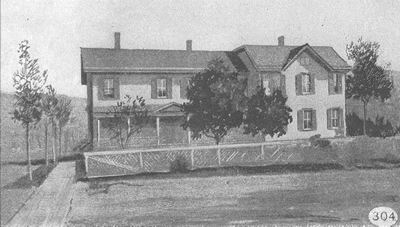 The
building being erected by the firm of Divine, Dubois & Co., was now
nearing completion. Though it is to be used as a residence for Alvin
Dubois and his wife, the young partner in the firm and who has charge of
the company's general merchandise store next door, a portion of the bottom
floor is to become a mercantile business, to be occupied as a tin shop and
stove store. A young member of the firm's Ellenville branch, a
twenty-two-year-old tinsmith named James Stevens, has recently moved from
his home in Napanoch and will become the manager of this hardware store,
and take up residence in the apartment overhead of the shop. - fred
The
building being erected by the firm of Divine, Dubois & Co., was now
nearing completion. Though it is to be used as a residence for Alvin
Dubois and his wife, the young partner in the firm and who has charge of
the company's general merchandise store next door, a portion of the bottom
floor is to become a mercantile business, to be occupied as a tin shop and
stove store. A young member of the firm's Ellenville branch, a
twenty-two-year-old tinsmith named James Stevens, has recently moved from
his home in Napanoch and will become the manager of this hardware store,
and take up residence in the apartment overhead of the shop. - fred
Sunday, August 23, 1874
"Stayed at home all day. Cyrus Mott and wife called
and stayed nearly all day. Cy and I went on the hill, mother went over to
Dave Munson's.
"Caught a skunk under the barn, killed it. Smell -
very strong."
Joel Kimball
The waters of Sand Pond, and its bounty under its
surface, were a popular a destination for anglers as any other body of
water in this newly accessible sportsmen paradise of northern Sullivan
County. One excursion, consisting of thirty anglers from New York, arrived
by train last week and were outfitted for the difficult journey up to the
pond at Shandelee. Their armada of boats covered all sections of the lake,
and their angling success proved bountiful as large numbers of fish were
caught, which, according to these sportsmen, were all sent back into their
watery habitat again.
Their stay on Shandelee during this excursion was
with the Wichtendahl family, German immigrants whose log cabin was
situated on the highest point of Shandelee. When arriving into the port of
New York, immigrants were met on the docks as they departed the ship by
agents for owners of large tracts of land. Solomon Royce was one such
landowner, whose land holdings encompassed much of the Town of Callicoon.
Considering German immigrants to be both hardworking and industrious, and
more likely to payoff their debt, Royce enlisted agents who were
themselves originally from Germany. Familiar with the home language, these
agents handed out flyers, printed in German, promoting the area, and were
highly successful in enticing this wave of newly arrived families to
settle in the valleys and hills of northern Sullivan County. Frederick
Wichtendahl moved up to Shandelee in 1860, erecting his cabin on the
one-hundred acre lot he would later purchase in 1864. - fred
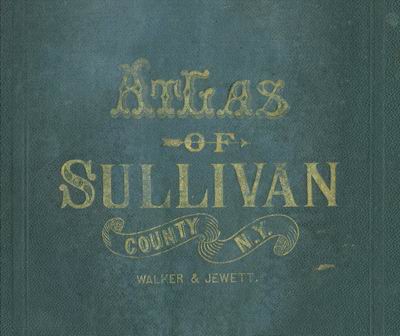 "Worked
at cutting oats until noon. After noon raked up and drew in 131 sheaves.
Went to Flats in evening and stayed all night at Green's."
"Worked
at cutting oats until noon. After noon raked up and drew in 131 sheaves.
Went to Flats in evening and stayed all night at Green's."Joel Kimball
"Sullivan County is to have a new map. The map man commenced dunning for subscribers in this town the other day. The price is $12. The map is to be in book form."
August 25, 1874
Rusticus
Evening Gazette
Tuesday, August 25, 1874
"At Green's, had
two pictures taken by Miller the artist. I walked home and went on the
hill and worked at the oats."
Joel Kimball
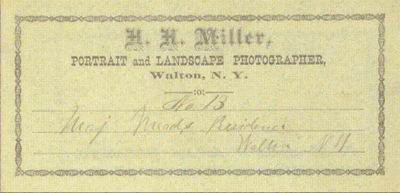 Hiram
Miller traveled to Westfield Flats with his wagon filled with photographic
equipment, setting up a temporary studio at Green's hotel to take portrait
photographs. This project would continue for the next couple of weeks,
beyond Westfield Flats, as he continued traveling up the road of the
Midland railroad, visiting the string of villages and taking portraits all
along the route.
Hiram
Miller traveled to Westfield Flats with his wagon filled with photographic
equipment, setting up a temporary studio at Green's hotel to take portrait
photographs. This project would continue for the next couple of weeks,
beyond Westfield Flats, as he continued traveling up the road of the
Midland railroad, visiting the string of villages and taking portraits all
along the route.
The young photographer, only thirty-three years of
age, had moved from a farm in upstate Otsego County, to Liberty around
1872, where he established his studio in that village. His stay in
Sullivan County was not for long, though, for by 1879, he had opened a
studio with a partner at Walton, in Delaware County. - fred
"Peeled two oar sterns and raked oats. After noon Wm. P. Rose helped me and we finished them and drew in two loads. Whole number oats. 660 sheaves, upset twice and did not get home until after dark.
"Wm. P. Rose due for one half day's work."
Joel Kimball
Joel has finally finished harvesting his oat crop. The three acres that were planted in the spring with oats yielded, after the stalks were threshed, forty bushels of grain. - fred
"James Rose came up and helped me untied my oats. I went to Westfield Flats, stopped at Uncle Oliver's and saw Bif and grandmother.
"Stopped at Joe Green's and cleaned my horn. Waited to have picture taken with the band. Could not get them together and came home, went to J Decker's and he was gone, then went to C Mott's and he was gone, W Davis, ditto. Called at Capt D.'s and came home.
"Some displeased
Joel Kimball
For Joel, today was one of those days where nothing goes according to plans. With Hiram Miller and his roving photographic studio still at Green's hotel in Westfield Flats, Joel was highly anticipating the community band's portrait. For the past year, the Westfield Brass Band had been in disarray, but recently there had been much interest amongst the members and as well as within the community to revitalize the musical group. Unfortunately, the membership did not show up at the hotel for the photograph.
"Displeased" could also be said to be the case for some folks who have seen their image for the first time in a photograph. Earlier, the local newspaper correspondent from Wurtsboro sat down for a portrait with Miller during the photographer's visit to that village. The scribe sat before Miller's camera with his terrier by his side, but upon seeing the final likeness, concluded that the pup was the best looking of the two. He journeyed up to Westfield Flats, invited by the local correspondent "Rusticus", to have another portrait taken by Miller, but this time without the dog to avoid the comparison. - fred
"Went on the hill and salted yearlings and split some rails. Called at Col Moore's in the afternoon and asked him for money, did not get any. Came home and called at post office. Warren one day."
Joel Kimball
In another cost-saving venture, the management of the financially troubled Midland railroad announced this week that the company was to discharge the bridge watchmen along its line. As the steam locomotives chugged its way over the wooden river crossings and trestles, live embers from the engine's firebox blown out of the stack had the potential for catching fire along the tracks, including the timbers on the bridges. Part of the watchman's responsibility was to watch for any such problems after the train passed through. But now, with the bridges having been coated with whitewash this past summer [see August 15th], company officials, in their effort to economize, felt there was no longer need to worry about the fire-hazard at river crossings since the coated timbers on the bridges were now considered fireproof. - fred
"Went on the hill and commenced to work road fence between Geo W Sprague and Wm P Rose. Made bareway and about one-half of the fence. After noon, went to blacksmith shop and got steers shod."
Joel Kimball
The Midland's paymaster traveled up the railroad's line paying the company's employees their overdue wages along the way; for the period during the first two weeks of June. Leaving Westfield Flats, he continued on with his journey of retribution, when at Fish's Eddy his car was rammed by the Walton gravel train. Luckily, this minor accident resulted in little damage and without injury, but the exact cause of the mishap was not divulged by the local papers; perhaps retribution of a different sort. fred
"Stayed home nearly all day, called at H E Rose's a short time. Saw train pass going to camp meeting. Weather very warm and dry."
Joel Kimball
The lack of houses of worship or scarcity of ministers within these upstate communities didn't deter rural folks from following their religious beliefs. Large evangelical-like events were organized, held at convenient central locations, attracting folks far and wide wishing to take temporary leave of their tedious home-life for inspirational celebration. Lasting for days, tents were pitched in fields at or near the site as the flock camped-out throughout the duration of the event. The meetings consisted of almost continuous services, preacher after preacher delivering long inspiring sermons, or firebrands advocating popular causes of the day, such as temperance or women's suffrage.
The camp-meeting at Philipsport, a community near the Midland railroad's line in the southern portion of Sullivan County, began on August 27th and was to last for the next eight days. The railroad company ran a special excursion train, one running in each direction to and from the site, on a daily basis throughout the event, attracting not only the religiously sincere, but also others who were attending out of mere curiosity. fred
"Worked on the hill. Drew rails out of the woods and made some fence, finished fence on one side of the road."
Joel Kimball
The Black Hills expedition [see July 30th] returned yesterday back to Fort Abraham Lincoln, in the northern plains of the Dakota Territory, after a two month journey of gathering information concerning the value of the land ceded as a reservation to the Sioux Indian nation. With rumors already filtering back east of boundless riches to be had with only the sifting of a pan in every brook and stream of the Black Hills, gold fever has again swept over the country as the nation awaited the final report to be submitted by the expedition's leader, George Armstrong Custer. Upon the return of the Seventh Cavalry from this arduous trek, Custer, in his usual unabashed swagger, boated that his command was still "in condition to take the field tomorrow" if so needed. fred